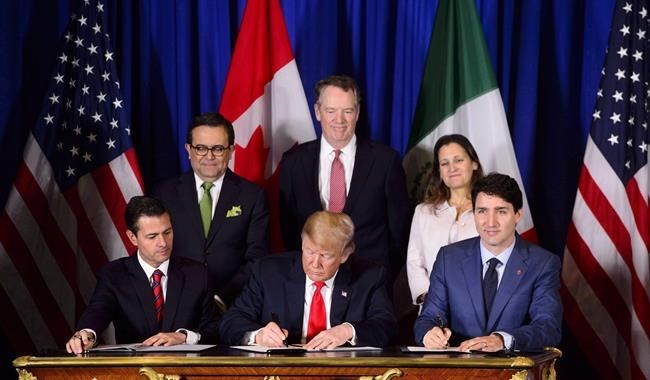WASHINGTON — A bipartisan duo of U.S. senators is leading a growing push to open up the continent's "gold standard" trade agreement to include parts of Latin America in order to build a better bulwark against China's geopolitical might.Â
Earlier this year, Louisiana Sen. Bill Cassidy enlisted Democratic counterpart and Colorado Sen. Michael Bennet to co-sponsor the Americas Trade and Investment Act, which would expand the U.S.-Mexico-Canada Agreement.Â
"Just looking at it from the U.S. viewpoint, we get more return on our foreign expenditure if we invest it with our neighbours than if we invest it overseas," Cassidy told a USMCA panel discussion.Â
"As Mexico becomes more prosperous, it benefits the U.S., and as U.S. prosperity goes, that benefits Mexico and Canada. That is the beauty of capitalism: everybody wins. And that's what I'm trying to do — everybody's a winner."
The event marked the launch Thursday of a new Council of the Americas report on the idea of "accession" to the USMCA, known in Canada as CUSMA, as a tool to reinforce economic strength across the entire Western Hemisphere.Â
The idea of hemispheric trade has hardly escaped the attention of the White House; during last year's Summit of the Americas, President Joe Biden announced the Americas Partnership for Economic Prosperity, one of several trade "frameworks" designed to fortify economic and geopolitical ties among key U.S. allies.Â
But "docking" current or future U.S. trading partners into USMCA promises "a much more pragmatic and effective approach," the report reads.
It would also mean "a larger capacity to Mexico, the United States and Canada to drive the hemispheric integration process."
Juan Carlos Baker, the report's co-author and one of Mexico's lead negotiators during the NAFTA talks that spawned the new agreement in 2018, called the deal a resounding success for all three countries.Â
"Canada and Mexico are now the preferred partners of the United States, and so are the other two partners," Baker said.
"With the high levels of uncertainty and volatility that we see all around us, it makes a lot of sense … to seek this alignment of potential allies around the values and the objectives that we as North American countries already have."
But uncertainty and volatility are precisely why reopening such a hard-won agreement could be a non-starter, said former diplomat Louise Blais, an adviser for the Business Council of Canada.Â
"There is no consensus in the U.S. government on this issue. I would not even qualify this discussion as having hit Main Street, despite Sen. Cassidy's efforts," Blais said.Â
The agreement requires all three parties to take part in a mandated review in 2026 and agree to maintain it, and most Canadian advocates agree that getting through that process unscathed is Job 1.Â
While the council is a strong advocate for trade and investment throughout the Americas, Blais said the priority is renewing the deal, not amending it.Â
Mary Ng, Canada's international trade minister, has already been lobbying hard for prompt trilateral endorsement. A statement from Global Affairs Canada late Thursday made clear that view hasn't changed.Â
"In its current form, the agreement contains no mechanisms to allow other countries to join in," said spokesperson Geneviève Tremblay.Â
"The addition of new partners to CUSMA is not something officials have discussed with the United States or Mexico. We are currently focused on full implementation, along with our current CUSMA partners."
Baker's report doesn't linger on the question of which Latin American countries ought to be invited to the North American trade party, but there are already obvious candidates with strong trade ties to the U.S.Â
Aside from Canada and Mexico, the countries currently taking part in the APEP framework discussions include Barbados, the Dominican Republic, Chile, Colombia, Panama, Peru, Uruguay, Ecuador and Costa Rica.Â
That latter country has already reaped the benefits of an existing Central American trade agreement with the U.S., but has long since outgrown it, said Manuel Tovar Rivera, Costa Rica's minister of foreign trade.Â
"We see it as a tight fit for us," said Tovar, noting that the country has built an impressive multinational medical devices sector as well as a burgeoning semiconductor industry that's already proving a key U.S. asset. Â
Costa Rica is also building out its aerospace and automotive industries, two areas of particular interest in North America, and attracting more foreign direct investment than ever before, he added.Â
"It is a different Costa Rica; it is a different region, different challenges," Tovar said. "We have taken this bold move to say, 'Listen, why not look at us?'"
Entering into USMCA would also make it clear to other countries throughout the region that there's a strong upside to shoring up the labour and environmental conditions joining the agreement would require, he added.Â
"We can send a strong message to those countries that are struggling in reforming themselves that, should they do the right thing, there's also a reward."
But the idea comes at a fraught political moment in the U.S., with former president Donald Trump — the original catalyst for renegotiating NAFTA — leading the race for the Republican nomination in 2024.Â
Mexicans, too, will go to the polls next year, while Canada will have to hold another federal election by the following October.Â
"Given the interest that the process will create, it is highly likely that the process of accepting new parties to the agreement may imply legislative processes," the report reads.Â
"Expanding the USMCA will demand an articulated strategy that considers the domestic political situation in Mexico, the United States and Canada, since the three countries will have general elections in 2024 and 2025."
This report by The Canadian Press was first published Sept. 14, 2023.Â
James McCarten, The Canadian Press




